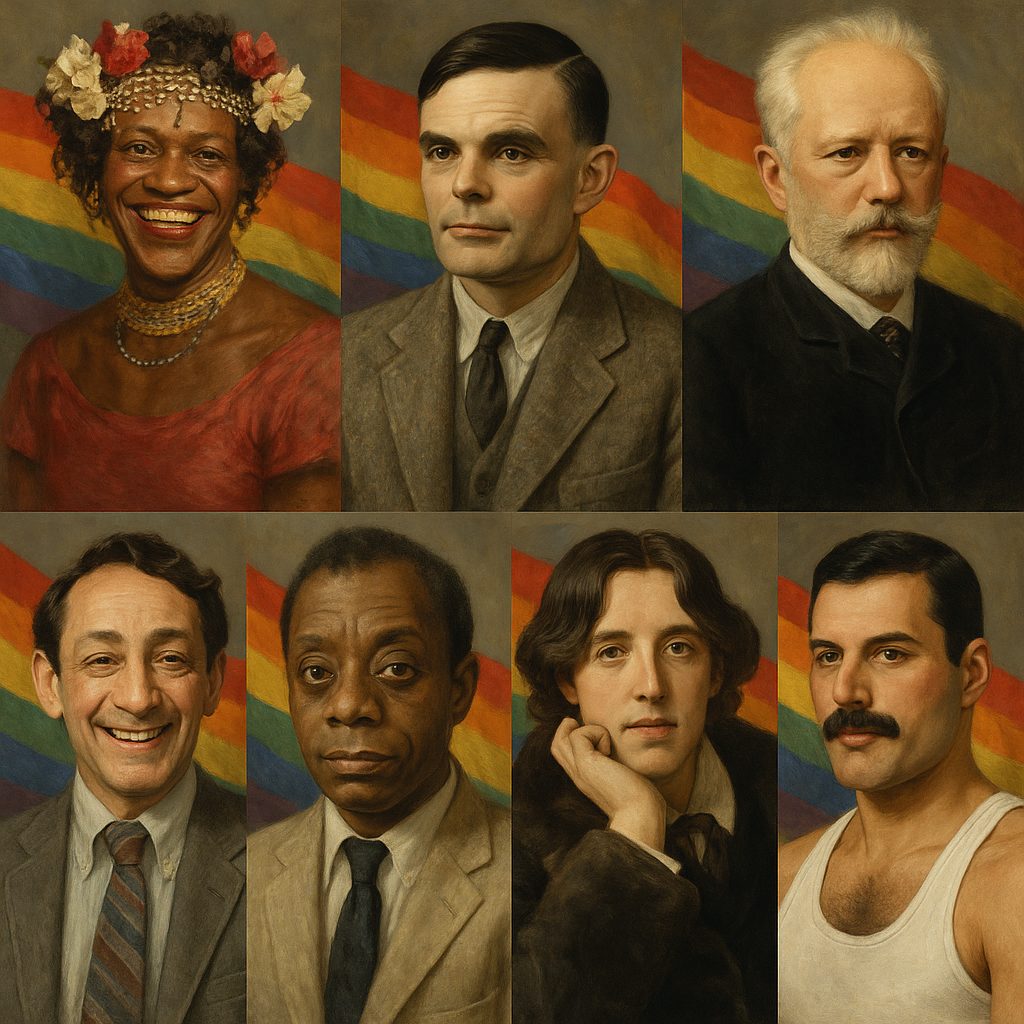
Eight voices, one movement. A tribute to the LGBTQ+ trailblazers who paved the way for equality with courage, brilliance, and defiance.
Legacy and Resistance: Icons Who Shaped the Gay Experience
In a world gradually bending toward justice, the legacies of those who came before us light the way. This article honors seven icons who shaped the gay experience, individuals whose courage and authenticity helped transform society’s understanding of LGBTQ+ people. Each figure’s story—marked by struggle, defiance, and triumph—echoes through time, reminding us of the progress, visibility, and resistance that underpin today’s fight for equality.
Marsha P. Johnson (1945–1992)
Marsha P. Johnson was a fearless Black queer activist whose bold presence ignited the gay liberation movement. A prominent figure in the 1969 Stonewall uprising, she fought back against oppression at a time when LGBTQ+ people were forced into the shadows. Johnson, a self-identified drag queen, co-founded advocacy groups to shelter and uplift transgender youth, embodying the spirit of chosen family and unyielding resistance. Her exuberance and resolve – captured in her famous phrase “Pay it no mind” – made her an icon of pride and perseverance. Marsha’s legacy lives on in every Pride march and protest today, a testament to how one person’s visibility and courage can spark lasting change.
Alan Turing (1912–1954)
Alan Turing was a mathematical genius who helped save millions of lives by decrypting Nazi codes during World War II, only to be persecuted by the country he served. This British codebreaker and father of modern computing lived under the weight of a secret in an era when homosexuality was a crime. When his orientation was discovered, Turing faced a cruel punishment—chemical castration—that ultimately drove him to despair. Yet even in tragedy, his story has become a powerful symbol: Turing’s posthumous pardon and recognition highlight how far society has come in righting past wrongs. His legacy of brilliance endures in every smartphone and computer, and his fate stands as a stark reminder of why we must continue to fight for justice and understanding.
Pyotr Ilyich Tchaikovsky (1840–1893)
Pyotr Ilyich Tchaikovsky, the renowned Russian composer of Swan Lake and The Nutcracker, poured into his music the passion and pain he could not safely express in life. In the late 19th century, Tchaikovsky navigated a society that demanded silence about his love for other men. Despite the isolation and fear he endured, his emotional depth found refuge in his symphonies and ballets, enchanting the world. Tchaikovsky’s personal struggle remained largely hidden behind a veneer of propriety, but today we hear his heart in every soaring melody. His enduring influence reminds us that art can be an act of quiet resistance—and that even when forced into the shadows, the truth of one’s soul finds a way to resonate across centuries, fostering empathy and progress in how we view love.
Harvey Milk (1930–1978)
Harvey Milk was a trailblazing politician and activist who transformed anger and hope into tangible change. In 1977, he shattered barriers as one of the first openly gay men elected to public office in the United States, giving a powerful voice to a long-silenced community. Milk championed laws to protect LGBTQ+ people from discrimination and urged individuals to come out, believing that visibility was the key to acceptance. His impassioned speeches and infectious optimism mobilized a generation to fight bigotry at the ballot box. Though his life was cut short by assassination, Harvey’s spirit endures—his legacy of hope and courage lives in the countless LGBTQ+ public servants and activists who continue his work today, proving that one person’s openness can inspire a movement and change the world.
James Baldwin (1924–1987)
James Baldwin wielded words as weapons, illuminating truths about race, love, and identity that society often refused to face. As a Black gay writer in mid-20th-century America, Baldwin refused to be silenced, using his essays, novels, and speeches to expose the pain of prejudice and the beauty of self-acceptance. Works like Giovanni’s Room dared to delve into same-sex desire at a time when such stories were rare, while his powerful voice in the civil rights movement insisted that all forms of oppression are intertwined. Baldwin’s eloquence and honesty provided a lifeline to those who felt unseen, bridging communities with empathy and intellect. Today, his legacy reverberates in discussions of intersectionality and social justice, reminding new generations that understanding one another’s humanity is both an act of resistance and a path toward progress.
Oscar Wilde (1854–1900)
Oscar Wilde was a literary luminary whose wit and flamboyance captivated Victorian society—until he was punished for the very love that inspired his art. As the celebrated author of The Picture of Dorian Gray and The Importance of Being Earnest, Wilde lived authentically in a time when doing so came at a devastating cost. His daring romance with Lord Alfred Douglas led to a notorious trial, and Wilde was convicted of “gross indecency” simply for being gay. He endured two years of hard labor in prison, emerging broken in body but unbowed in spirit. Wilde’s fall from grace became a rallying cry for future generations; the injustice he suffered highlighted the need for change. His enduring influence is evident not only in the continued adoration of his work but in the modern push for LGBTQ+ rights—progress that vindicates his belief that “love is love,” and that no one should be punished for who they are.
Freddie Mercury (1946–1991)
Freddie Mercury, the magnetic frontman of Queen, commanded the world’s stages with a flamboyant presence and a vocal range that defied limits. He enthralled stadiums in an era when queer performers were expected to hide, yet Freddie lived with a bold authenticity—reveling in androgynous fashion, opera-influenced rock anthems, and the freedom of self-expression. Though he guarded his private life, Mercury’s very public persona shattered stereotypes and offered a beacon of representation to fans who rarely saw themselves reflected in rock royalty. His battle with AIDS, kept mostly out of the spotlight until the very end, became a poignant chapter of his story. When he tragically died in 1991, the world was forced to confront the AIDS crisis and its stigma, and in the wake of his passing, awareness, compassion, and activism surged. Freddie’s legacy endures in every barrier-breaking performer he inspired and in the continued fight against HIV/AIDS—proof that even in death, a voice can spark change.
Conclusion
As we reflect on these extraordinary lives, we see how each courageous act of authenticity has rippled outward, shaping the course of history. In today’s sociopolitical climate, their legacies serve as guiding lights. The progress we cherish—greater visibility, legal victories, and evolving attitudes—was built on the foundations they laid through resistance and resilience. Yet, their stories also remind us that the journey is far from over. Each generation stands on the shoulders of these icons, drawing strength from their sacrifices and wisdom from their perseverance. By honoring their memory and sharing their stories, we reaffirm a simple truth: every step forward in the fight for equality—every protest, every coming-out, every act of solidarity—carries the spirit of those who fought before. And with that spirit alive in us, we continue the march toward a world where everyone can live openly, proudly, and without fear.
Carrying the Torch: Learning from the Past, Fighting for the Future
The journeys of Marsha P. Johnson, Alan Turing, Pyotr Tchaikovsky, Harvey Milk, James Baldwin, Oscar Wilde, and Freddie Mercury span continents and centuries, but together they tell one story: the story of a people’s long march from invisibility to dignity. Thanks to these trailblazers, someone like me can live openly – getting married, pursuing a career, walking hand in hand with a loved one down the street – freedoms that were pipe dreams or outright crimes in their day. Their legacies live in our everyday lives. Every Pride Month, every anti-discrimination law, every LGBTQ+ student club or inclusive workplace owes a debt to the bold steps they took. We see Marsha’s and Harvey’s faces in our marches and political victories; we hear echoes of Wilde and Baldwin in our literature and advocacy; we feel Turing’s and Mercury’s influence in technology and music that unite people. They made the impossible possible.
Yet, as these heroes would be the first to remind us, progress is not a straight line nor guaranteed to last. Today, even as we benefit from the gains they helped achieve, we face a wave of new challenges that in some ways mirror the past. Around the world – from the United States to Eastern Europe and beyond – there is an alarming rise in anti-LGBTQ+ sentiment and laws. In many cases, this backlash is tied to a broader rise in authoritarianism and attacks on democratic norms. Indeed, analysts note that “threats to LGBT rights are increasing around the world, often hand-in-hand with anti-democratic measures.” When a government scapegoats LGBTQ+ people, it’s often a warning sign of deeper troubles: the erosion of minority rights as a whole and a tilt toward tyranny. We see it in Hungary, where Pride marches were effectively banned under the guise of “protecting children”. We see it in Russia, where even discussing LGBTQ+ topics openly can now be treated as a crime. We see it in a surge of anti-LGBTQ legislation in several U.S. states, targeting everything from classroom discussions to transgender healthcare. History shows that gains can be rolled back if we become complacent. The fight our forebears began is ours to continue.
What can we do? First, we can remember and draw strength from the stories of those who came before. Their resilience in far harsher conditions should inspire us to face today’s struggles with the same determination. Second, we can speak out and stand together – just as Baldwin linked arms with civil rights leaders, just as Milk built coalitions, just as Marsha and Sylvia shouted “No pride for some of us without liberation for all of us!” Unity is our greatest weapon against those who seek to divide and oppress. Finally, we must take action, both in our everyday lives and in the public arena. That might mean something as celebratory as joining a Pride parade, or as urgent as rallying against discriminatory laws.
In fact, a new generation of activists is already rising to the occasion. This year, a nationwide protest known as “No Kings Day” has been organized as a response to increasing authoritarian threats. Scheduled on the birthday of a former leader with autocratic ambitions, it’s a day when citizens will march in cities across the country to say: We reject tyranny, and we stand for democracy and equality. The name “No Kings Day” evokes the very essence of what our LGBTQ+ trailblazers fought for – a world with no kings, no superior class of people dictating how others should live or love. I’ll be marching on that day, carrying the lessons of our heroes with me. I invite you to join, wherever you are, in body or in spirit, to honor the legacy of those who paved the way. Let’s show that the community Marsha and Harvey helped ignite, that Baldwin and Wilde dreamed of, that Turing and Mercury in their own ways advanced, will not slide back into silence.
And beyond one march or one month, I want every reader to know: you’re not alone. The path forward can be overwhelming, but we walk it together. As someone who lives proudly and works in the community, I am committed to being there for others – whether you need a trusted friend, an advocate, or even practical help like finding a safe home in a welcoming neighborhood. (After all, I’m not just an LGBTQ+ writer, but also a real estate professional who believes deeply in building safe, inclusive communities.) Consider this an open invitation to connect with me. Share your story, your worries, your hopes. Whether you’re looking to participate in activism, need resources or advice, or are seeking a home where you can truly belong, I’m here to help as a safe and trusted advisor.
Our predecessors fought so we could have choices and chances they never did – the chance to live authentically, to love who we love, and to pursue our dreams. It’s now on us to defend those hard-won freedoms. Let’s honor Marsha, Alan, Pyotr, Harvey, James, Oscar, Freddie and countless others by how we live today. Let’s educate others about their legacies, push back against hate, and create the more just world they envisioned. Each of us can be a link between the past and the future – carrying forward the pride and courage of yesterday’s pioneers into tomorrow’s victories.
This Pride season, take a moment to remember the giants who made our lives possible. Then, in their spirit, take action – whether by marching on “No Kings Day,” volunteering for an LGBTQ+ cause, or simply reaching out to someone who needs support. And if you ever need guidance, community resources, or a conversation about finding your place (literally or figuratively) in this world, I encourage you to reach out to me. Together, in solidarity and love, we can ensure that the legacy of these LGBTQ+ trailblazers continues to shine bright, lighting the way for generations to come.

 Facebook
Facebook
 X
X
 Pinterest
Pinterest
 Copy Link
Copy Link




